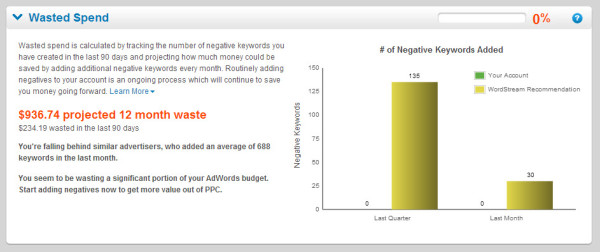The Real Reason AdWords Isn’t Working For Many Small Businesses
By now, you’ve probably read the New York Times piece that’s been making the rounds lately. If not, here’s the upshot: it concludes that Google AdWords isn’t practical for small businesses. Unfortunately, it’s not the first time the Gray Lady has gone after AdWords, nor is it the first time that the paid search community […]
By now, you’ve probably read the New York Times piece that’s been making the rounds lately. If not, here’s the upshot: it concludes that Google AdWords isn’t practical for small businesses.

Unfortunately, it’s not the first time the Gray Lady has gone after AdWords, nor is it the first time that the paid search community has responded so vigorously in its defense. The real tragedy of the latest piece isn’t that AdWords has been singled out – it’s that the Times (and the business owners it interviewed) have once again missed the point.
I Get It
Before I go into how the article got it so wrong, I should say that I see where the author and her interviewees are coming from and that I sympathize with their positions. Let’s face it – times are tough for small businesses.
Customers are becoming increasingly choosy (and have many more options, and therefore more power, than they did in the past), external costs are going up, and rising above the noise of the paid search space is becoming harder. However, saying AdWords isn’t a viable option for small businesses based on a single metric – media cost – is way off base, and more than a little misleading.
In the article, author Adriana Gardella highlighted several small-business owners who chose to turn their backs on AdWords due to cost. Online shopping tool Hukkster was one example. Erica Bell, one of Hukkster’s two co-founders, claimed that “determining which keywords drive traffic simply wasn’t worth the expense.”
Another company highlighted in the piece was event organization firm Skylight Group. For owner Jennifer Blumin, cost wasn’t necessarily the problem with AdWords, but rather the quality of conversions resulting from Skylight’s strategy. Blumin said that her company was “inundated” with poor-quality inquiries, many of which simply couldn’t afford Skylight’s services.
Fundamental Misunderstandings
Both these examples reveal fundamental misunderstandings about AdWords as a paid search platform.
For Hukkster, the perceived costs of running an effective AdWords campaign were prohibitive – but Gardella chose not to mention how much time, if any, Bell and her co-founder had put into researching keywords that would result in higher conversion rates from the outset, or search terms that similar businesses were using. Similarly, Skylight – by Blumin’s own admission – was bombarded with inquiries, suggesting that the problem isn’t with the platform itself, but how they managed it.
Here’s where the biggest disconnect occurs for many people when it comes to PPC. It’s not about the cost per click – it’s about how much effort advertisers put in.
At WordStream, we work with lots of AdWords advertisers, many of which are small businesses. Unfortunately for most, the situation isn’t great. However, dismissing paid search as a customer acquisition strategy would be crazy. Why? Because for many AdWords customers, the cost of the ads isn’t the issue.
Yes, many of our clients come to us in need of some serious help, but empowering businesses to take control of their paid search initiatives is about evaluating what isn’t working – and why – before making decisions based on real insight. If you just throw money at a problem, it should be no surprise when it turns out to be expensive.
Mistake #1: Infrequent Logins
PPC can be a tough nut to crack for small businesses, but devoting just a little more time to managing a paid search campaign can be enough to put you ahead of the vast majority of advertisers.
With more than half of AdWords users only bothering to optimize their campaign once per quarter, is it any wonder that some small businesses are failing to see the results they’d hoped for? Let’s take a look at an example client.
Mistake #2: Not Enough Activity
After this client performed an audit of their PPC campaign, they discovered that their paid search efforts left a lot to be desired. Having added just 30 keywords to a campaign – in three months (and no new campaigns, or ad groups or ads!) – is obviously not enough to generate success.
As a result of the lack of account activity, virtually all aspects of this customer’s PPC campaign suffered. Poor keyword targeting and low quality ads subsequently resulted in low click-through rates. This, in turn, had a negative effect on the client’s Quality Scores and Impression Shares.
Mistake #3: No Negative Keywords
This advertiser also failed to add any negative keywords to their AdWords account, resulting in significant waste in PPC spending.
In the following figure, you’ll see that the yellow bar is our recommendation of how many negative keywords should be added to this AdWords account (based on the advertiser’s budget and industry), versus how many are actually included (zero).
Looking at this example of projected waste for the next 12 months, it’s easy to see why so many business owners mistakenly believe that paid search isn’t for them – but simply putting in a little more work can solve many of these problems.
AdWords isn’t a magic bullet that will solve businesses’ paid customer acquisition problems. Like anything else, success takes hard work and dedication.
However, none of these aspects of paid search were addressed in the article, which is likely why the PPC community was so quick to point out the flawed reasoning behind it. It’s easy to blame cost and say that AdWords is “too expensive” for small businesses, but that doesn’t make it true.
How You Can Beat The Odds (Whatever Your Budget)
So, what does all this mean for the average small-business owner thinking about taking their tentative first steps into the world of paid search? Well, there is some good news.
Firstly, the bar set by many AdWords advertisers is very low. This means that even a small amount of work can make a huge difference and put advertisers ahead of their competitors.
Secondly, it would be easy to dismiss the PPC campaign of the client featured in my example as a failure – but, on the contrary, this business owner is actually a genius. Why? Because they realized their paid search efforts weren’t working, and they proactively took steps to find out why by performing an audit.
Once they discovered why their AdWords campaign wasn’t performing, and learned how they could improve their efforts, they were able to start making improvements.
There are more than enough myths about AdWords out there. Articles like the most recent piece in the New York Times merely serve to create and perpetuate more.
Image used by permission from Shutterstock.com
Contributing authors are invited to create content for Search Engine Land and are chosen for their expertise and contribution to the search community. Our contributors work under the oversight of the editorial staff and contributions are checked for quality and relevance to our readers. The opinions they express are their own.
Related stories
New on Search Engine Land


